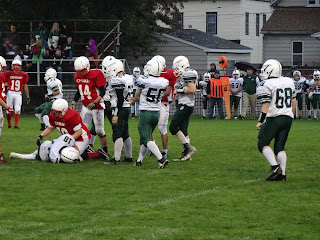MATTHEW 22:1-14
THE KING HAS PREPARED A FEAST.
In the name + of Jesus.
“The kingdom of heaven may be compared to a king who gave a wedding feast for his son...” (Matthew 22:2) This very first sentence tells us a great deal about the kingdom of heaven. It is ruled by a gracious King. He invited many to the wedding feast for his Son. He did not sell tickets or talk about a fee. He supplied all things for his guests. He prepared choice food for them at his own expense. He had taken pains to let his subjects know that the feast was coming and that they would be the King's honored guests at his banquet. When all things were ready, he invested the time and energy to gather those who had already been invited. Finally, this was all done to honor the King's son to celebrate the union of him with his bride. The King wanted to share his joy by graciously bringing many guests into his feast.
So, the cry went out. The King has prepared a feast. But when these subjects were told that all things were now ready, they despised the King's feast and rejected the King's grace. At first, they simply ignored the King's summons. The King, ever gracious, sent out more servants to repeat the summons. “The King has prepared a feast. Come and rejoice!
Come to the wedding feast.”’ But they paid no attention and went off, one to his farm, another to his business, while the rest seized his servants, treated them shamefully, and killed them. (Matthew 22:4-6)
While some of the king's subjects violently rejected the king's grace, others just shrugged it off. One went to his farm, another to his business. They did not go out to do anything wicked. One could even argue that their pursuits were noble. But no matter how noble their activities were, the fact is that they rejected the king's grace. The king did not refuse them grace; they rejected it.
The King had prepared a feast, and it was despised and rejected. Therefore,
the king was angry, and he sent his troops and destroyed those murderers and burned their city. (Matthew 22:7) It was not only the murderers who fell under the King's wrath and judgment; it was also the subjects who found other things to do than to go to the wedding feast. Polite rejection is still rejection. This, too, earns the King's wrath.
Jesus' parable was fulfilled shortly after his ascension. The Jewish people who had rejected Jesus as their Messiah fell under God's judgment. The Lord sent the Roman armies into Jerusalem who then destroyed the city and burned it to the ground. Whether politely ignoring God's promises or plotted the death of God's Son, they had rejected God's grace. They paid the price for it in 70 AD and even worse, eternally.
Even though many fell under the King's judgment, the King was still determined to be gracious.
He said to his servants, ‘The wedding feast is ready, but those invited were not worthy. Go therefore to the main roads and invite to the wedding feast as many as you find.’” (Matthew 22:8-9) The servants went out and found whoever they could. They did not run background checks to see who was good or bad. They gathered whomever they could, whether good or bad, so that the wedding banquet would be full. For the King had prepared a feast, and the King was determined to have grace upon people.
Now, the heavenly King has been most gracious to you. He had no reason to choose you to be a part of his kingdom, but he did. He has spared no expense to bring you into his kingdom. The King sent his Son, Jesus Christ, to labor throughout his life, to resist all temptations, and to provide perfect obedience to all of God's Commandments. Jesus did the work that we have not done so that God's Law would be fulfilled in perfect, willing obedience. This work had to be done; and now we have one who has done the work. More than that, Jesus did the work for us. The holiness you need to have to dwell in God's kingdom Jesus supplies.
And again, when it comes to taking away all that brings the King's wrath against you for resisting his word, failing to do what he commands, or even refusing to do what he commands, Jesus has done the work for you. Jesus has suffered the curse for your sins. Jesus has taken the wrath of God from you and was put to death in your place. You, on the other hand, have been set free from guilt, from punishment, from wrath, from hell, and from a cursed death. You have been brought into God's kingdom. Jesus has secured your place at the heavenly feast.
The King desires to be gracious. The King has prepared a feast for you. St. John wrote,
“Blessed are those who are invited to the marriage supper of the Lamb.” (Revelation 19:9) This is eternal life in the heavenly kingdom where you will be forever free from problems, stress, temptations, and evil. There, you will know only joy, celebration, happiness, and blessing. The Lord Jesus has secured your place at this heavenly feast. There is no greater blessing for you.
But you do not need to wait until you die to partake in this feast. The King has prepared a feast, and the fact is that he invites you to it Sunday after Sunday. Look at this altar. The feast is here. It is not reserved for some special day when you have departed from this world. It comes to you now. And you need it now. What is this feast? Jesus himself tell you: It is the body and blood which Jesus gave into death to gain for you the forgiveness of sins, new life, and salvation. This is the heavenly banquet which is delivered on earth. Here, the King feeds you to forgive your sins, to deliver you from death and the devil, and to strengthen and sustain your faith against all the threats in the world which try to deceive you and rob you of your salvation. The King summons you to this feast not for his benefit, but for yours. He desires to be gracious. He desires to bring his salvation to you.
But what does it mean when we politely reject the King's summons? It was not just the murderers whom the King slaughtered in the parable; it was also the ones who politely declined coming to the King's feast because they had better things to do. Polite rejection is still rejection. It is telling the King, “I don't need your blessings; I have all I need. Now excuse me, I have to get back to what matters to me.” It is despising the King's grace for worldly goods, and it forfeits the good the King desires to give.
The King has prepared a feast. And the King desires to be gracious. If we refuse his grace, he will find others to whom he will be gracious. For the King desires to have his wedding hall filled with guests to whom he will be gracious. What's more, the King even supplies the wedding garments for us so that we will not be like the guest who was cast out of the feast. Naturally, the guest who had been pulled off the street would not have been wearing the right garment when he was brougth to the King's feast. But the King is gracious. He not only provides food for his guests, he would have even provided the garments. But this guest, too, had rejected the King's grace. He did not put on the garment the King had given him.
The garment the King gives you is your baptism. St. Paul wrote,
“As many of you as were baptized into Christ have put on Christ.” (Galatians 3:27) We cannot stand before our Lord in our sinful garments. Even our best works are filthy rags (Isaiah 64:6). Therefore, the Lord covers us in the righteousness of Christ. Your baptism supplies the very holiness God demands of you. The King sees you now as holy and blameless and, therefore, worthy to have a place at the feast. And it is through the feast that the King keeps you in his favor here until he finally delivers you to your place at the wedding feast of the Lamb forevermore. The King has prepared a feast. The King is eager to be gracious to you. He rejoices that you are here, because he delights in being gracious to you and saving you. And he will be eternally pleased that you will rejoice in his grace here and hereafter.
In the name of the Father and of the Son + and of the Holy Spirit. Amen.














































